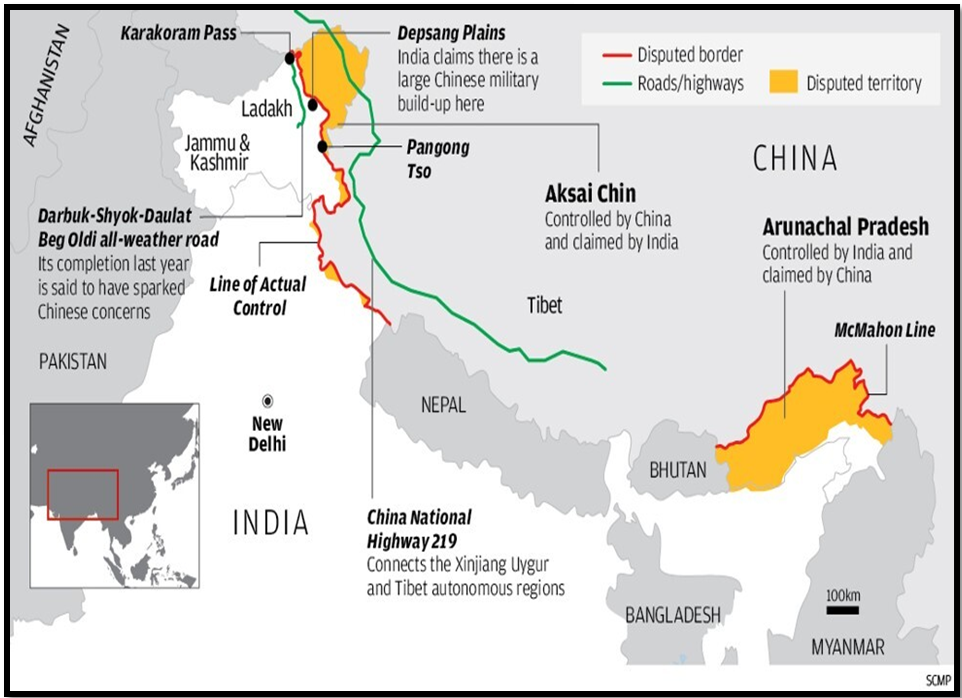FIVE GUIDELINES TO A DRAGON-ELEPHANT TANGO
Syllabus:
GS 2:
- India and its Neighbourhood- Relations.
- Effect of Policies and Politics of Developed and Developing Countries on India’s interests.
Why in the News?
The deteriorating relations between China and India have intensified, highlighted by recent disputes involving diplomatic actions and legal challenges. The focus is on establishing effective guidelines for mutual respect, understanding, trust, accommodation, and accomplishment to stabilize and advance bilateral relations amid ongoing tensions.
Source: SCM
Overview:
The Dragon-Elephant tango is a metaphor for the complex and evolving relationship between China and India, emphasizing mutual respect and cooperation.
Principles of Peaceful Coexistence
- Guiding Principles: The “Five Mutuals” extend and develop the Five Principles of Peaceful Coexistence, providing a framework for China-India relations.
- Mutual Respect Echoed: These principles echo mutual respect, sensitivity, and interests, aligning with the Indian leader’s vision for bilateral relations.
- Implementing Consensus: The “Five Mutuals” offer practical guidelines for implementing the important consensus reached by the leaders of China and India.
- Navigating Relations: Acknowledging the ups and downs in relations, both civilizations should steer bilateral interactions towards positive outcomes and mutual benefit.
- Historical Ties: Historical connections, like those observed in Nalanda, highlight the potential for a strong future relationship between China and India.
- Future Outlook: With strategic guidance from both leaders, the Dragon-Elephant tango can lead to harmonious coexistence and cooperative development.
Mutual Respect
- Practical Approach: Mutual respect is crucial for improving China-India relations. Engaging in local customs, as seen in my visit to Maharashtra, fosters better understanding.
- Cultural Appreciation: Recognizing each other’s unique cultural traditions and developmental paths enhances mutual respect and collaboration in a historically rich relationship.
- Respect for Differences: Understanding that both nations have distinct lifestyles and traditions helps in fostering a positive environment for bilateral interactions.
- Open-Minded Engagement: It’s important to view each other’s developmental goals and social systems with openness, promoting joint prosperity and regional stability.
- Historical Influence: Historical exchanges between China and India show the importance of mutual respect in overcoming differences and working together effectively.
- Future Potential: By respecting each other’s roles on the world stage, both countries can advance their development and contribute positively to global affairs.
Mutual Understanding
- Shared Struggles: Both nations empathized with each other’s struggles for independence and support each other’s aspirations for national rejuvenation and strategic autonomy.
- Effort for Prosperity: China understands the efforts required for India’s development, and India should reciprocate by promoting dialogue to enhance mutual understanding.
- Dialogue Importance: Increasing exchanges and dialogue across various sectors is vital for building political trust and deepening mutual understanding.
- Foundation for Growth: Solid political and public understanding forms the basis for strengthening bilateral relations and achieving long-term cooperative success.
- Cultural Exchange: Encouraging more people-to-people interactions will enhance mutual understanding and support for each other’s developmental objectives.
- Enhanced Communication: Both countries need to improve communication channels to address misunderstandings and build a stronger relationship.
Mutual Trust
- Strategic Perspective: Viewing each other through a strategic lens helps in avoiding mutual suspicion and fostering cooperative relationships.
- Dispute Resolution: Maintaining trust is essential for peaceful coexistence and resolving disputes amicably, which strengthens bilateral relations.
- Trust Building: Political trust is necessary to overcome challenges and ensure that disagreements do not derail the cooperative efforts between China and India.
- Cooperation Focus: A focus on mutual development opportunities rather than rivalry or threats is crucial for a stable and productive relationship.
- Enduring Friendship: Trust enables both nations to work together effectively, even amidst global uncertainties, ensuring a robust partnership.
- Positive Outlook: The willingness of the Chinese people to be good friends and partners reflects a commitment to fostering a positive and trusting relationship.
Mutual Accommodation
- Handling Differences: Accepting and managing differences in a constructive manner is key to maintaining a stable and cooperative relationship between China and India.
- Political Wisdom: Drawing on ancient political wisdom to resolve differences and focus on core interests ensures that the relationship remains productive.
- Effective Dialogue: Engaging in dialogue to address and accommodate each other’s major concerns helps in finding mutually acceptable solutions.
- Comprehensive Relationship: The relationship should be viewed as all-encompassing, not limited by specific disagreements or incidents.
- Conflict Resolution: Effective management of differences through dialogue prevents disruptions in cooperation and supports overall relationship stability.
- Continued Cooperation: Maintaining a broad and inclusive approach to cooperation helps both nations navigate and resolve differences while advancing shared goals.
Mutual Accomplishment
- Development Goals: China and India, as emerging economies, should focus on achieving mutual developmental goals and leveraging opportunities for growth.
- Shared Vision: Both nations should support each other’s developmental visions, like China’s modernization and India’s “Viksit Bharat 2047,” to foster mutual success.
- Global Role: Cooperation in achieving national development contributes to a constructive role in international and regional affairs, benefiting both countries.
- Collaborative Success: Working together to help each other succeed and promote global South unity enhances the overall impact of their partnership.
- Future Prospects: Joint efforts in development and revitalization strengthen their position in global affairs and support a shared future for mankind.
- Community Building: Collaborative actions contribute to building a community with a shared future, emphasizing the importance of mutual accomplishment in global development.
Conclusion
The “Five Mutuals” offer a pathway to resolving the current discord between China and India. By adhering to principles of mutual respect, understanding, trust, accommodation, and accomplishment, both nations can navigate their complex relationship and work towards a stable and prosperous future together.
Mains Practice Question
Discuss the “Five Mutuals” proposed for enhancing China-India relations. How can these principles address the current challenges in their bilateral ties and contribute to regional stability? Provide examples to support your arguments.
Source :The Hindu
Associated Article:




